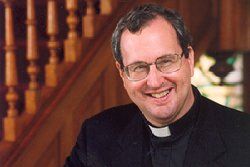
"[W]e shouldn't be surprised to find so many deeply devout men among the greatest of mathematicians. Blaise Pascal, inventor of probability theory, is one of the most penetrating theologians who ever lived. Leonhard Euler was the Johann Sebastian Bach of German mathematics in the 18th century: a devout Lutheran, happily marled, with a big brood of children, and possessed of immense creativity and intuition. Bernhard Riemann originally went to the university to become a pastor; his tombstone cites Saint Paul: All things work together for those who love God. Georg Cantor, the titan of set theory and discoverer of trans-finite numbers, believed that his work on the nature of infinity demonstrated the necessary existence of God. Kurt Gödel, inspired by Cantor's work, turned his own world-shaking Incompleteness Theorem to account, developing from it a revision of Saint Anselm's proof. Albert Einstein was once asked why he wanted to work at Princeton. 'So that I can have lunch with Kurt Gödel,' he said."
Anthony Esolen. Link.
Fr. Spitzer observed the same thing in his excellent Finding True Happiness: Satisfying Our Restless Hearts
If we assess the collective thought of the three greatest theoretical physicists, one of the greatest astrophysicists, and one of the greatest mathematicians and logicians of our age, it reveals a conviction about the reality of the transcendent domain arising out of (1) the rational essence of our universe, (2) the transphysical dimension of mathematical and scientific thought, and (3) the intelligibility of mathematics and logic itself.









